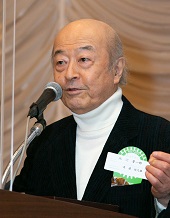The Synergy of Music, Film and Stage Play��
December 2, 2020
Mr. Ikebe
Professor Emeritus of Tokyo College of Music
Composer
�� I have dedicated my career life to music. ��Pure music�� in Japanese refers to symphonies, piano concertos and operas but I don��t feel comfortable using this term, because other so-called ��incidental music�� in movies, plays, TV and radio dramas will then become ��impure.�� I prefer to use the terms ��concert music�� and ��accompanying music (in plays and dramas)�� for classification.
I have dedicated my career life to music. ��Pure music�� in Japanese refers to symphonies, piano concertos and operas but I don��t feel comfortable using this term, because other so-called ��incidental music�� in movies, plays, TV and radio dramas will then become ��impure.�� I prefer to use the terms ��concert music�� and ��accompanying music (in plays and dramas)�� for classification.
��I have worked on NHK (Nippon Hoso Kyokai, Japanese public broadcaster) historical drama series five times and composed 650 pieces for each series that had 47-48 episodes and ran for a year. I started working with the Director after ��picture lock,�� discussed and decided where to put the music in the 45-minute video, measured the time and composed each music piece so that it could set the mood, highlight a specific event, and give the video an emotional strength.
��I have also worked on 70-80 movies and stage plays. It was my great honor and pleasure to have worked with world-renowned movie directors including Akira Kurosawa, Shohei Imamura and Tadashi Imai. It surely was a blessing to have worked on a number of their masterpieces.
��Mr. Kurosawa was known for his unrelenting professionalism. Prior to the actual film shooting, he created precise drawings of all the shots and circulated them among the crew. After filming completed, he added classical music pieces to the unedited version and asked me to draw inspiration from them. The first film I worked on was Kagemusha (Shadow Warrior). Mr. Kurosawa chose a well-known piece like ��Peer Gynt�� by Edvard Grieg as the opening and added ��Light Cavalry�� by Franz von Suppé for a different scene as a reference. I tried to guess which element attracted him the most that made him select a given piece, say the melodic line, the rhythm or the musical instruments. I took the opportunities to wine and dine with him and deep dived into his mind to capture the core message he wanted to get across through his movies and music. Mr. Kurosawa left many impressive words regarding music. One request I was given was not to write impeccable music, because he believed music would make a perfect scene when combined with the image, thanks to its transformative effects that could enhance a moment and elevate whatever feelings a specific scene was communicating. If I had added a grand concert piece to the scene, the music would become too intrusive.
��When I write music for movies and TV programs, the acting part has already completed so music has no direct influence on actors or actresses. When it comes to stage plays, however, music can set the pace and tone of the entire performance. Having worked on nearly 500 theatre music pieces, I have had some interesting experience of observing firsthand how music can take control of the entire stage. Earlier in my career, a stage director requested me to write a music piece for a well-known play ��The Tragedy of Julius Caesar�� by William Shakespeare. The music was to accompany a long three-minute solemn soliloquy by Brutus, a role played by an acknowledged actor. I wrote a rather somber music to encapsulate the agony and lament of Brutus. My music was based on the time measured with precision and I recorded the piece. Now when I played this rather pathetic music during the stage rehearsal, it turned out the music had a direct influence on the actor and the speed he delivered the lines became much slower. The actor found it quite embarrassing and complained that I should have written a longer piece of music. The director was also upset with me. But I knew deep down that my music was based on the accurate time measurement and it was the actor who was overwhelmed by the tone of the music but without realizing it.
��When it comes to music for TV dramas, however, I need a totally different approach. Usually, we enjoy TV dramas in a living room or in a kitchen, often times while we are doing something else at the same time. Music here assists to capture the attention of the audience and helps illustrate a scene, setting, background or even a character.
��Today, I shared how music can create synergy between different genres of movies, stage plays and TV dramas. I believe the never-ending mission of composers is to create a best mix of the advantages of various approaches, methods and media. Having worked on ��accompanying music�� throughout my career, it opened doors to a diverse set of fields and encounters. I hope you will also seek opportunities to create synergy among different elements and perspectives to make your life exhilarating and inspiring.